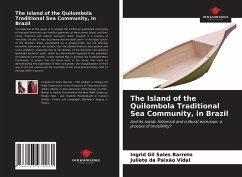The objective of this paper is to analyze the traditional quilombola community of artisanal fishermen and shellfish gatherers of Maré Island, Brazil, and their social, historical and cultural exclusion, which resulted in a process of invisibility. For this, it was discovered that the elitist perfi l of the legal culture of the Brazilian State, perpetrated by a programmatic but not effective normative democratic law system, has not allowed Brazil to face political and social problems, especially due to the dictates of the dominant neo-capitalist globalized economic order, which are diametrically opposed to the population of traditional communities. It was realized that, in practice, the Traditional Maré Community, in praxis, has not found echo in the voices that insist on demonstrating the exploration of their ecosystem, the marginalization of their way of life and culture and the invisibility of the socio-environmental confl ict through which it passes.








